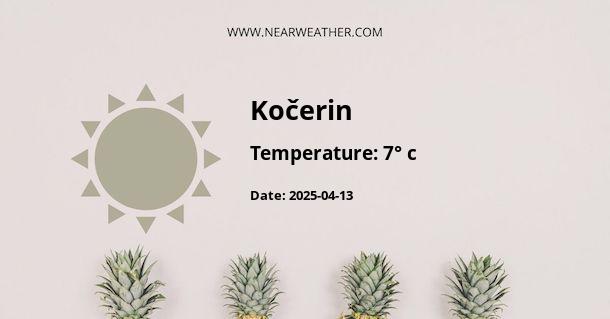Climate and Weather in Kocerin, Bosnia and Herzegovina
The climate in Kocerin, a picturesque village situated in the Western part of Bosnia and Herzegovina, reflects the interplay of Mediterranean and continental influences. Kocerin, with its characteristic landscape and geographical position, experiences a varied climate that transitions between the coastal warmth and the brisker, continental conditions of the interior. Understanding the weather patterns and climate throughout the year in Kocerin is essential for both residents and visitors planning to explore the region's natural beauty and cultural offerings.
General Climate Overview
Kocerin sits in a climate zone that is often described as a temperate continental climate with Mediterranean influences. This mix results in warm summers and cool winters, with marked variations in temperature and precipitation throughout the year.
Monthly Weather Breakdown
Let’s delve into a month-by-month analysis to paint a detailed picture of what one can anticipate in terms of weather patterns in Kocerin:
- January: The coldest month of the year, where temperatures can plummet below 0°C (32°F). Snowfall is common, making it a rather wintry month.
- February: Slightly warmer than January, yet still within the grips of winter. Snow remains present with occasional periods of thawing.
- March: Signifies the onset of spring with fluctuating temperatures that begin to thaw the landscape.
- April: A noticeable warming trend, with more consistent spring weather. Occasional rain showers are common.
- May: A pleasant month with considerable greenery and an uptick in temperature, heralding the coming of summer.
- June: Warm and generally comfortable, with longer days. The chance of precipitation begins to increase.
- July: The peak of summer, characterized by warm to hot days and sporadic rain or thunderstorms.
- August: Similar to July, with some of the highest temperatures of the year. Occasional heatwaves may occur.
- September: A gradual cooldown begins, with a mix of warm days and cooler nights. Early autumn foliage starts to appear.
- October: A distinct drop in temperatures as fall progresses, accompanied by increased rainfall.
- November: Noticeable cooling with a higher probability of frost. End of the fall season leading into winter.
- December: Marks the return to colder weather with potential snowfall and frosty conditions, setting the stage for winter.
Annual Temperature and Precipitation Averages
Getting more scientific, we can look at the annual temperature and precipitation averages to glean a better understanding of Kocerin’s climate:
| Month | Average High (°C) | Average Low (°C) | Precipitation (mm) |
|---|---|---|---|
| January | 5 | -3 | 70 |
| February | 7 | -1 | 65 |
| March | 11 | 1 | 70 |
| April | 16 | 5 | 75 |
| May | 21 | 9 | 85 |
| June | 24 | 13 | 90 |
| July | 27 | 15 | 80 |
| August | 27 | 15 | 80 |
| September | 23 | 11 | 85 |
| October | 17 | 7 | 80 |
| November | 11 | 3 | 85 |
| December | 6 | -1 | 75 |
Note: These figures are approximate and can vary slightly from year to year due to climatic fluctuations.
Weather Events and Climate Conditions
The climate in Kocerin is susceptible to certain weather events that can impact the region significantly:
- Bora Winds: These strong northeasterly winds can occur during the winter and spring, bringing sudden cold spells and clear skies.
- Sirocco Winds: Typically in the autumn and spring, these southeast winds can carry warm, moist air from the Adriatic Sea.
- Fog: In the autumn and winter months, fog can be a frequent visitor, particularly in the valleys and along riverbeds.
- Thunderstorms: Summer months may witness intense, albeit brief, thunderstorms that provide much of the region's annual rainfall.
- Frost: Overnight frost is common in the colder months, particularly from November through to March.
Climate Change Impact
Like many other parts of the world, Kocerin is not immune to the impacts of climate change. According to recent scientific studies, Bosnia and Herzegovina has seen alterations in its climate patterns, with increased temperatures, shifts in precipitation, and a higher incidence of extreme weather events. These changes are influencing water resources, biodiversity, forestry, and agriculture in the region, prompting the need for adaptive strategies to mitigate climate-related risks.
Recommendations for Visitors
If you are planning a visit to Kocerin, it is advisable to tailor your travel plans according to the seasonal conditions:
- Spring (March to May): Pack layers, as the weather can fluctuate. Prepare for rain showers by bringing waterproof gear.
- Summer (June to August): Opt for light clothing, sunscreen, and a hat to protect from the sun, but also bring something for the occasional cool evening.
- Autumn (September to November): Similar to spring, be prepared for changing conditions with an emphasis on warmer attire as November approaches.
- Winter (December to February): Heavy coats, gloves, and hats are necessary to face the cold, while sturdy boots are recommended for snowy conditions.
Conclusion
In conclusion, Kocerin offers a dynamic climate with distinct seasons that can cater to a variety of preferences and activities. Whether you're looking to enjoy the winter snowscape, the bloom of spring, the warm summer sun, or the colorful autumns, Kocerin provides a backdrop for memorable experiences year-round. Keeping abreast of the local weather forecasts and climate trends is essential for maximizing your time in this captivating Bosnian locale.
A - Kočerin's Latitude is 43.389721 & Longitude is 17.485001.
A - Weather in Kočerin is 7° today.
A - Climate Conditions in Kočerin shows broken clouds today.
A - Humidity in Kočerin is 82% today.
A - Wind speed in Kočerin is 4 km/h, flowing at 21° wind direction. today.
